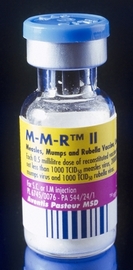Measles – MMR vaccination against measles
What is measles?
Kor – a highly contagious viral infection. It is caused by the measles virus.
The virus spreads, usually, winter and spring, by direct contact with secretions from the nasopharynx an infected person. Less Measles can be spread by droplets in the air. Kory contagious:
- For 1-2 days before the onset of symptoms;
- 3-5 days before the rash appears;
- Through 4 days after the rash appears.
Symptoms include:
- Fever (often severe);
- Cold;
- Red eyes;
- Cough;
- Specific rash.
Symptoms usually begin 8-12 days after infection. The rash lasts about 4-6 days. Full recovery may take 7-10 days. In severe cases, (or people with compromised immune systems) after recovery can cause serious infections of the brain or pneumonia. Severe brain damage and death are very rare in developed countries.
Measles was once common diseases in childhood. Now, in connection with vaccination cases become smaller and smaller
Although you're unlikely to get sick with measles, if you were vaccinated during childhood, unvaccinated or improperly vaccinated people are at increased risk of measles, if they:
- Living in crowded and / or unsanitary conditions;
- Travel in less developed countries, where measles is a common disease;
- They have a weakened immune system (eg, as a result of HIV), even if previously vaccinated;
- Born after 1956 years and have never had measles;
- We get vaccinated only inactivated or killed vaccine prior to 1968 year (Live vaccines are now much more efficient).
Because measles is caused by a virus, it can not be treated with antibiotics. Treatment is focused on relief of symptoms, the following methods:
- Gargle with warm salt water;
- Using humidifiers;
- Sponge;
- Receive a large quantity of liquid and antipyretic drugs, which do not contain aspirin. Attention: Aspirin should never be prescribed for children and adolescents, who are sick or recently hurt a viral infection;
- Reception of vitamin a – can be useful for people, which are deficient in vitamin A.
What is the measles vaccine?
Corey vaccine contains living cory viruses, chicken embryos grown in cells. Viruses, used in the vaccine are neutralized during the production process.

Despite, that there is a separate core vaccine, it, usually, goes in combination with vaccines:
- Mumps, and rubella (MMR);
- Mumps, Rubella, varicella (MMRV).
The vaccine is injected under the skin.
When and who should get vaccinated against measles?
All children (with some exceptions), You should be vaccinated twice:
- IN 12-15 months;
- IN 4-6 years (before entering school) – Vaccination can be performed before, but the introduction of doses of vaccine should be carried out with a difference at least four weeks.
The vaccine may also be administered to children 6-11 months, if they travel abroad. These children should also get vaccinated at the age of two 12-15 months 4-6 years.
Persons aged 18 years and younger, who were not vaccinated, administered two doses of MMR vaccine, with a difference of four weeks.
Adults, who were born after 1957 year, and which have not previously been vaccinated, perhaps, required 1-2 doses. Talk to your doctor, If you have not previously been vaccinated.
Risks, associated with measles
Most people, receiving the vaccine does not have any side effects. The most common side effects are fever and rash. It may be swelling and redness at the injection site. Rare complications include:
- Anaphylactic shock – heavy, a life-threatening allergic reaction;
- Temporary thrombocytopenia – low platelet count, that may cause bleeding;
- Seizures in Children, predisposed to febrile seizures (convulsions, accompanied by a high fever).
Who should not get vaccinated against measles?
In some cases, vaccination should be postponed:
- In children with high temperature – vaccine can be introduced with minor illnesses;
- Recently received therapy with corticosteroids or immunoglobulins.
Although the majority of children and adolescents should receive immunizations according to schedule, certain groups must not be vaccinated:
- Individuals with impaired immune systems (eg, AIDS). If you have HIV without any complications, you should consider vaccination. If you have HIV, measles can be deadly;
- Pregnant women should avoid vaccination. You also need to plan for future pregnancy for at least one month after administration of the vaccine;
- There was a severe allergic reaction to the vaccine or its components;
- There was previous thrombocytopenia, obviously, related to vaccine.
Person, which correspond to one of the following criteria and are immune to measles must not be vaccinated:
- Were two measles vaccination attenuated vaccines – the first on the second day after birth, second approximately four weeks;
- He was diagnosed with measles;
- A blood test indicates immunity to measles;
- Born to 1957 g.
What are some ways besides vaccination can prevent measles?
If you have the measles, You must be isolated, to stop the spread of the virus. For Example, Children with measles should stay home until recovery.
For people, are exposed to the virus and are not vaccinated, It can be injected immunoglobulin. Prick contains antibodies against the virus. Introduced within six days after the onset of measles, immunoglobulin can protect you. This is particularly important for:
- Children aged less than one year;
- Pregnant women;
- Individuals with disorders of the immune system.
Immunoglobulin should not be administered to persons, received at least one vaccination after 12 months of age, and not having the immune system disorder.
What happens in the event of an outbreak of measles?
For suspected measles must be notified to health authorities. If you suspect, that you or your child is sick with measles, tell your doctor.
If you were not fully vaccinated, you need to be vaccinated.
